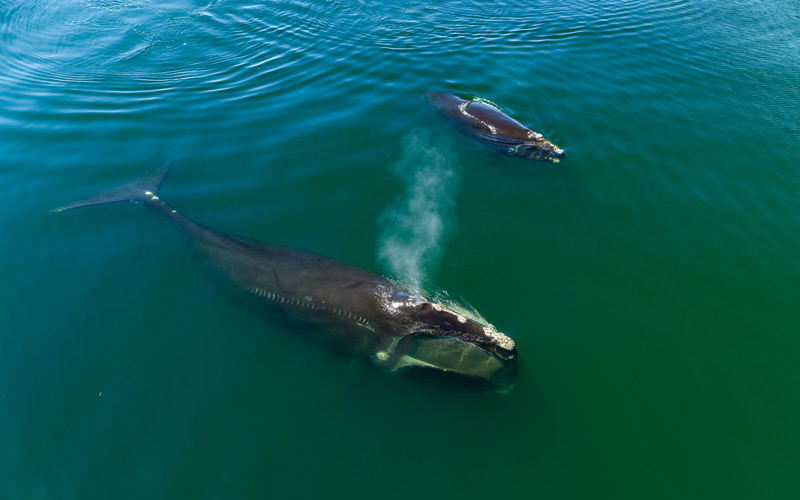
Photo: Brian Skerry
November 1, 2022 (BOSTON,MA) — Conservation groups filed an emergency rulemaking petition with the National Marine Fisheries Service today to protect critically endangered North Atlantic right whales from being struck and killed by vessels in their calving grounds off the coast of the southeast United States.
The requested rule mirrors a Fisheries Service proposal to set speed limits for vessels 35 feet long and greater and expand the areas where speed limits apply. The agency has yet to finalize that proposal, and the emergency rule would help prevent incidents like the boat collision that killed a right whale calf off Florida last year and likely fatally injured its mother, who has not been seen since. That collision also resulted in a $1.2 million loss of the vessel.
“Speeding ships can’t be allowed to kill mother right whales and their babies during this year’s calving season, so federal officials have to act quickly,” said Kristen Monsell, oceans legal director at the Center for Biological Diversity. “Endangered right whales need better protection from vessels now, or the species faces extinction. It’s up to the Fisheries Service to immediately implement more protective speed restrictions in the whales’ only known calving grounds.”
Vessel strikes are one of two primary threats to the species’ existence, along with entanglements in commercial fishing gear. Right whales begin giving birth to calves around mid-November and the season lasts until mid-April. Both females and calves in southeastern waters are especially vulnerable during that time. Current regulations are not sufficient to protect the whales, and changes proposed by the Fisheries Service in August seem unlikely to go into effect before this year’s calving season.
“Right whales have journeyed to the Southeast since time immemorial to birth and nurse their calves in the safety of warm, shallow waters,” said Jane Davenport, senior attorney at Defenders of Wildlife. “But the calving grounds have become killing grounds. If we don’t protect vulnerable mother-calf pairs, we cannot protect this species’ future.”
Right whales birth and nurse their calves off the southeastern coast from Cape Fear, N.C., in the north to below Cape Canaveral, Fla., in the south. Pregnant females and mothers with nursing calves are especially at risk of vessel strikes because of how much time they spend near the water’s surface. Calving females are also critical to the species’ survival and recovery. Scientists know of no other calving grounds for the right whale.
During the last calving season, a 54-foot boat struck both a newborn calf and its mother off St. Augustine, Fla. The collision killed the calf and seriously injured the mother, who hasn’t been seen since.
“A newborn calf spends most of the first few months of its life on the surface with its mother,” said Erica Fuller, senior attorney at Conservation Law Foundation. “Given that these whales are tough to see under the best of circumstances, slowing boats down is the only way to prevent collisions like those that have killed whales, injured people, and caused major vessel damage in the past.”
Today’s petition comes after the Fisheries Service issued a proposed rule in August 2022 to expand the existing vessel speed rule to smaller vessels and more areas. The current rule requires vessels 65 feet in length and greater to slow to 10 knots or less to protect right whales in certain areas at certain times. The agency has noted that a rule expansion is essential to preventing the whale’s extinction. But the agency’s proposed rule does not appear to be on track to go into effect by the start of calving season, necessitating an interim solution.
“Slowing down is the best way to reduce accidental collisions, which is why there are speed zones around schools,” said Regina Asmutis-Silvia, executive director of Whale and Dolphin Conservation. “Striking a whale not only puts the whales at risk but also can cause serious damage to vessels and injure passengers. Slowing down can save lives while it also saves a species.”
The conservation groups’ petition urges the Fisheries Service to immediately apply the agency’s own proposed rule in the right whale’s calving rounds. It asks the agency to expand the existing seasonal speed zone to include more waters in the calving grounds between Florida and North Carolina and to apply the rule to vessels 35 feet in length and greater. The petition also asks that the agency make dynamic speed zones mandatory in the calving grounds following several reports that vessels are not complying with voluntary measures.
Scientists at the New England Aquarium recently determined that only 340 North Atlantic right whales remain, with about 70 reproductive females. The population has continued to decline from previous years, and right whales only give birth every 3 years to 10 years.
The Fisheries Service has determined that, given the high mortality level and declining population, at least 50 calves would need to be born each year for several years to stem the decline and put the species on the road to recovery.
Experts are available for further comment.
###

